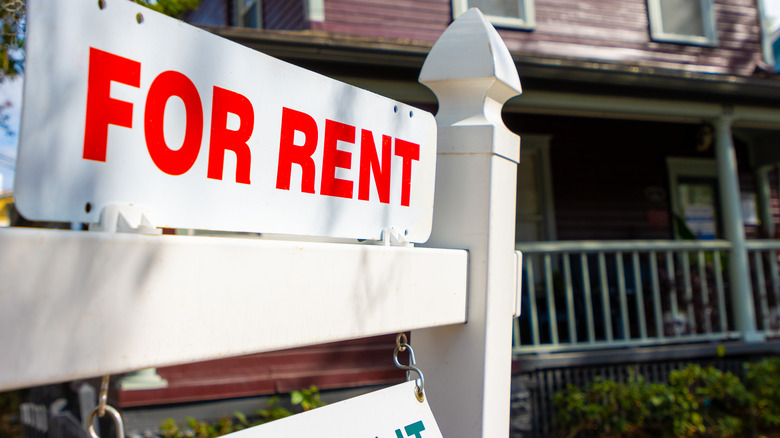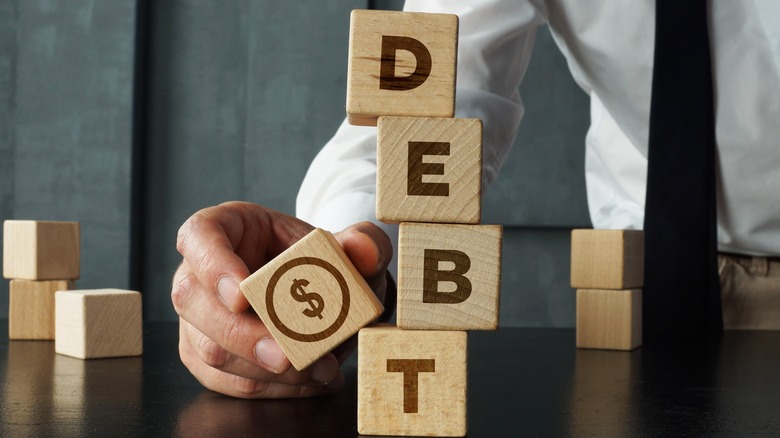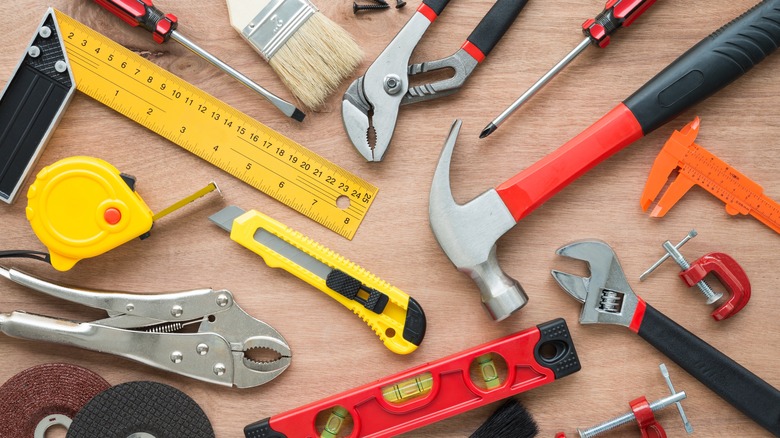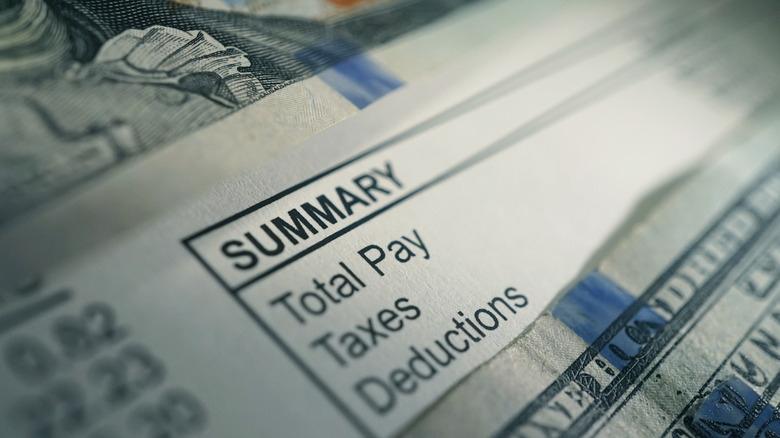Common Money-Saving Tips You Should Ignore
Modern savers are inundated with nuggets of supposed wisdom. Some come from parents or grandparents, while others have been circulated through the media and become part of communal understanding. The common adage that people should cut out the morning latte to get rich is drummed up so often that it feels more like a scold than common sense advice. Indeed, while cutting out small expenses like this can save you money over time, the tip isn't actually helpful in the grand scheme of things.
Many pieces of wisdom might have started out as great advice, but have slowly transformed into money-saving tips that should no longer be heeded. Some have lost their value with the gradual economic changes that naturally take place over time, while others are quality advice for certain stages of life but lose their effectiveness when taken out of context. Still, other tips didn't represent good advice to begin with. In addition to cutting out morning coffee stops, these are some of the most common money management nuggets that might not serve you very well. Ignoring them — in whole or part — might be the smart move.
Renting is throwing away money
One common piece of thinking is that renters are wasting their financial resources building equity for someone else. Homeowners pay monthly for their property as well, but at some point in the future, those payments will translate into total ownership of the home. Renters, on the other hand, are either supplementing a landlord's income or paying off the mortgage for them. As a result, many people believe that renting is a fruitless endeavor that leaves people without valuable property.
But the math on renting versus buying isn't that simple. Renters gain a unique advantage for their willingness to pay for someone else's equity. Instead of having to fix a broken window, replace a worn-out dishwasher, or overhaul the roof, a renter can simply pick up the phone and pass the buck on to the owner. Renters aren't responsible for most issues that arise in the propertty, and that's a powerful resource. Additionally, some buyers are hyper-focused on owning a home and don't take the time to explore the nooks and crannies of the property they're purchasing. The "just buy a home" mentality can result in a property that requires substantial work, adding tremendously to the total expense. This phenomenon is known as being "house poor." It's also possible to become house poor for a lengthy period by locking into a mortgage repayment obligation that's too expensive. Homeownership isn't for everyone, so a blanket prescription to purchase a home is errant advice.
Skip the morning coffee to improve your savings balance
This especially egregious advice has been floating around for years and is predicated on the idea that young people spend too much of their discretionary income on small luxuries that are massively inflated in price. Making coffee at home is certainly much cheaper than ordering a complex drink at Starbucks or your favorite local coffee shop. A cup of black coffee brewed at home costs roughly 56 cents, compared to the average price of $2.70 when prepared elsewhere. However, the statistics just don't back up the myth that people are constantly wasting their money on coffee. Many coffee drinkers spend less than $20 per month at coffee establishments, and only 32% of people routinely spend their money on coffee one to three times per week.
While any penny saved is a penny earned, the few dollars saved hardly stack up as a viable means of making substantial savings progress. More importantly, it's thought that the coffee issue has been coopted as a neat trick designed to shift the focus of our society away from the economic quagmire that has come to dominate wage policy, the cost of housing, and many other aspects that govern financial life. Instead of thinking about big-picture issues, like inflation concerns, gas prices, or stagnating wages and employee protections, the coffee conundrum acts as a distracting side issue.
Don't save until you've eliminated debts
Credit card debt costs significantly more than the typical savings account or investment will make. Investors hope to enjoy returns that average around 7% to 10%, and savings accounts average a yield of 0.6% as of November 2023 (although high-yield accounts that rise to 3% or 4% can typically be found). The imbalance leads many to think that saving is futile while high-interest credit card debt remains on their books. You may have heard that you should pay off your debts before getting serious about saving, but this is downright lousy advice.
Saving comes in many different forms. For one thing, everyone should be saving for their retirement in a 401K account or something similar. These assets will continue to grow in value over the long term, and they aren't accessible until you're ready to use them for their purpose. This puts retirement planning in a different universe to routine saving strategies or an account set aside to purchase a home or car. Similarly, building up a cash reserve for emergency savings should never be put off. Emergency savings accounts are designed to support you through hard times, whether they be a short-term spending need or a prolonged loss of income. If you've put off adding to either of these kinds of savings tools in favor of paying off credit cards, an emergency will likely see you returning to the cards you've diligently worked to manage.
Don't use grocery delivery services
The choice to avoid added fees that come from grocery delivery services might seem like common sense. Keeping your bill as low as possible is always sage wisdom. However, in certain circumstances, a small, added expense can actually promote a larger volume of savings overall.
By picking out your groceries, you save on delivery charges, but you're also subjected to the powerfully suggestive marketing that grocery stores employ. These outlets have been purpose-built to elicit impulse spending, and the longer you stay inside the grocery store the more likely you are to buy things you didn't intend on picking up when you arrived. A delivery service almost completely defeats this fiscal enemy — though digital storefronts still try to induce additional spending. Another important factor that focusing solely on the delivery charge misses is the saved time. Instead of spending an hour or more each week heading off to purchase groceries, this time can be utilized to tackle other chores that might otherwise infringe on your free time in the evening or over the weekend. Delivery fees end up buying back a bit of savings on impulse purchases as well as crucial time to spend with loved ones.
You don't need life insurance (yet)
Life insurance can seem unnecessary for those without other family members relying on them or for those who are still very young. However, life insurance is a valuable financial product, almost as a rule. Life insurance policies are built primarily to provide a financial boost to those you leave behind. A common way to evaluate life insurance needs is to calculate via the DIME method (Debts, Income, Mortgage, and Education). You'll want to cover all your expenses, including potential college payments for children, as well as 10 times your annual income if you opt to follow this calculation model.
Those who don't have dependents or a spouse might consider life insurance to be an unnecessary addition. Yet, a policy can be taken out to cover your existing debts and funeral costs (almost $8,000 on average for a burial in 2023). This will ensure that the family you'd leave behind in the event of an accident or sudden illness isn't financially devastated as well as emotionally traumatized. In another vein, many life insurance policies include, or allow for the addition of, living benefits. This means that if you're diagnosed with a terminal illness you can access the benefit amount while you're still alive. This funding can go a long way to supporting your treatment costs or a whirlwind trip with loved ones in your final month. The value of life insurance isn't just as a protection for others, it can benefit you as well.
Stick with your insurance company for loyalty discounts
Many people from older generations will point to brand loyalty as a powerful tool for accessing discounts. Managing insurance policies through the same provider for many years once counted as a substantial factor in creating a new quote around the expiration date of each successive coverage policy. Parents and grandparents therefore point to building a relationship with insurance providers fairly regularly, as a result.
But the modern marketplace has changed. You may see discounts for keeping a policy with the same company for a few years in a row, but it's equally likely to find the same or even better price reductions when shopping around and making a change to a new brand. Insurance providers are constantly on the hunt to draw in new customers, and that means enticing people away from their existing insurance company. The result is a landscape of insurance providers that want to maintain happy, loyal customers, but seemingly put more stock in signing up new ones than keeping those already on their roster. Steep discounts often come through making a switch, and there's no reason not to look for alternatives that can save you money every year.
Keep your savings in cash
Some people advocate for withdrawing some or all of their savings and keeping it in cash. This provides a very specific, yet narrow level of security. In the event of a bank failure, your money will remain safe. Likewise, cash savings isn't subject to the fluctuations in value that would otherwise influence investments. But the benefits of keeping your money this way are extremely limited. Funds deposited in bank accounts are almost certainly FDIC-insured up to $250,000. This means that you'll get your money back if the bank flounders.
Cash is just as easy to spend as money in a bank account, and the physical nature of the asset means that you are personally responsible for its safekeeping rather than an institution that does that kind of thing as a business. Theft is a big threat to savings kept in cash. Anyone who knows that you hold onto a large sum of capital is a potential threat to your savings' armor. They say that loose lips sink ships, and all it takes is for someone to tell a story about your savings approach to the wrong person or in the company of a rogue opportunist for your money to become a target. Similarly, a fire in your home can send your life savings up in flames with no recourse to recover the funds. While it may be a valuable budgetary tool to spend in cash, saving should be done with the help of a bank.
Carry a small credit card balance to build your credit
Using credit cards is a fantastic way to create a credit history and build up a solid credit score over the long term. Generally speaking, it's a good idea to use your card on a routine basis and pay down the balance every month when it's due. A card's statement balance tells you how much of your spending will bear interest in the upcoming period if it's not paid off. Paying the statement balance every month will save you from interest payments and likely result in a small rollover balance that will then need to be squared away during the following month.
This is a good habit, but for those who use multiple credit cards or find themselves in the habit of overspending on their credit accounts, this can be a dangerous approach. If you're working to pay down a large balance on one or more cards, eliminating spending on other credit accounts should be made a priority over the savings and credit improvement benefit that may be gained from this strategy. It's easy to fall back into the habit of overspending when you're stretched thin trying to pay off old credit card balances.
Always buy in bulk to save on shopping expenses
Buying in bulk is generally a great way to save over the long term. Bulk purchases mean you'll have to find places to store extra goods — everything from canned food to toilet paper and bars of soap — but the cost per item or the equivalent price per pound can be drastically lower when purchasing in larger volumes. Mark Cuban in particular is someone who advocates for bulk buying whenever possible.
Yet, bulk shopping isn't always feasible. On non-perishables, this strategy is a surefire hit. If you can afford to spend more on a larger bag of rice, bulk packages of paper towels, or an increased volume of batteries, absolutely take advantage of the overall value boost. But for things like fruits and vegetables, this isn't always the best way forward. The reality is that perishable goods don't share the same natural benefits when bought in bulk. Non-perishables won't go bad — or won't for a very long time. This means that if you can store the excess, you can use it at some point. Guitarists will always need picks, golfers won't ever lose the need for new golf balls or tees, and everyone requires things like socks and batteries. On the other hand, if you won't use a gigantic bag of onions before it goes bad you're better off purchasing a smaller one even if the heavier sack of vegetables is more economical per unit.
Save a standard 10% of your income for retirement
A common piece of advice floating around out there is that 10% of each paycheck should be dedicated to retirement savings. This nominal figure offers a good general starting point when planning for retirement. But the reality is that everyone's savings capabilities and requirements will be unique to their own circumstances and needs. For those who find themselves slightly behind the eight ball on retirement savings, a more ambitious goal might be in order. Moreover, in many instances older workers earn more than younger ones as a result of their experience and time with a company. As you age your salary is likely to rise alongside your career progression. This means that you may be able to contribute more to your retirement savings as time goes on.
The truth is that saving 10% is a standard figure is a great starting point for retirement planning but it shouldn't act as gospel for all savers, regardless of age, income, or individual savings goals. On another note, while planning for retirement, it's crucial to take advantage of any contribution matching scheme your employer offers. By not claiming the free money that's offered, you're doing your future self a genuine disservice.
Just DIY it
Engaging in DIY projects is a great way to save money — sometimes. Getting involved in fixing your home or building something new for the apartment can be a great way to learn how to manage your living space more directly. But it's also a great way to pour your all-important time, energy, and money into a project that only ends up needing a professional fix at the end of the road anyway. Not all home improvement projects are created equal. For many repairs and new installations, you'll be better off purchasing furniture, hiring a professional, or otherwise relying on expert services rather than your own intuition and handiwork. While the DIY route can be a phenomenally rewarding experience, you may end up spending just as much to buy materials and new tools as you would have otherwise when it comes to many home improvement projects. The resulting build or repair work might also lack quality, further taking away from the usefulness of this approach.
DIY projects come with a major caveat. Some people just have a knack for making stuff and fixing things. Combined with a robust arsenal of tools and know-how, a motivated individual can accomplish a lot on a shoestring, DIY budget. But this approach isn't for everyone, and some people are simply better off avoiding this kind of work altogether to save themselves the heartache, invested time, and money that it requires.
Save the majority of your income
In the same way that a prescription to save a standard amount of money means well but isn't actually great advice, the age-old wisdom to save most of your money also falters. This is common advice for first-time workers who are just starting out with their first job as a teenager or young student. At this point in life, most workers aren't earning a paycheck to support themselves or their family — although this certainly does happen. Most youth employees are looking to establish savings for their college years, trying to earn a bit of disposable income to go out with their friends on the weekends, or perhaps even building the early rumblings of a business investment fund.
For many young workers, this paycheck isn't strictly a necessity. As a result, many parents advise their children to save half of their paycheck to impart the importance of savings and to build for the future while their earnings aren't essential to daily needs. But this advice quickly becomes antiquated as workers age out of their childhood home and are forced to confront the real world that waits for them. It's important to prioritize savings but an aggressive strategy like this is very limited in its utility.
Make extra mortgage payments to save on interest
Overpaying on your mortgage is an age-old tip for money management and debt reduction. But the idea of quickly reducing a mortgage obligation is a holdover from a different time that no longer applies. Decades ago, credit card debt, student loans, and medical bills (among other personal borrowing norms) didn't complicate the debt load of the average consumer in the way they do today. As a result, many homeowners carried little to no debt beyond their mortgage obligation. Overpaying on this home loan was therefore good advice for reducing interest payments and cutting down on the length of the loan.
But the reality of the contemporary borrowing marketplace is that home loans are some of the lowest-interest products available. Anyone juggling credit card bills, student loan repayments, and a mortgage will undoubtedly understand the importance of paying their mortgage on time every month. But they'll assuredly place this near the back of the line as a result of the crushing interest rate attached to monthly credit card bills with rollover balances. In today's financial era, there are much better ways to allocate surplus debt repayment funds than on the mortgage.
Don't talk about money with other people
Lastly, many people still feel a bit of a stigma surrounding money conversations. This is especially true for those in the workplace, but this is precisely the space where you should be talking about money. Here, conversations around money take on a different kind of importance. Talking about your wages and other elements of your job responsibilities and compensation package helps create transparency among colleagues. An open dialogue surrounding compensation throughout the office helps employees at all levels defend collectively against discriminatory practices and unfair treatment. The reality is that the only way to know if you're underpaid (or overpaid) for the work you're doing is to talk about it with the people you share your workplace with.
Essentially, learning how to manage your money more effectively requires you to talk about it with others. The average American wasn't made to take financial literacy courses in high school or beyond and therefore must seek out educational sources in this realm on their own. Speaking with others is the only way to gain a more comprehensive understanding of what it means to budget effectively, how to use a 401K to your advantage when planning for your retirement, or whether or not to allow additional withholdings on your monthly taxes.














